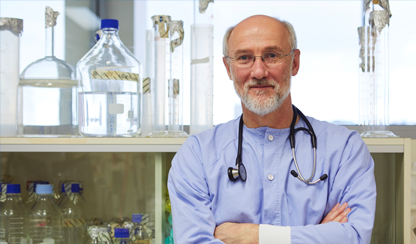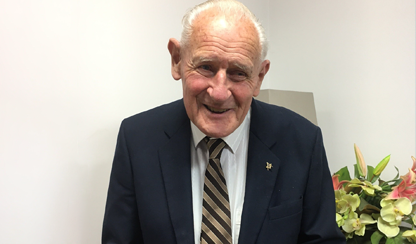Professor Karlheinz Peter joined the Baker Institute from Freiburg University in 2015. He has spent the last 15 years working on some of the world’s most groundbreaking research in cardiology.
 Professor Peter is the Deputy Director (Basic and Translational Research) of the Institute. He is also head of the Atherothrombosis and Vascular Biology laboratory and leads the Atherothrombosis Program. When he is not in the lab, he is an on-call cardiologist at the Alfred Hospital.
Professor Peter is the Deputy Director (Basic and Translational Research) of the Institute. He is also head of the Atherothrombosis and Vascular Biology laboratory and leads the Atherothrombosis Program. When he is not in the lab, he is an on-call cardiologist at the Alfred Hospital.
Professor Peter’s love of science, chemistry and physics started at an early age, but it wasn’t until his father experienced a heart attack in his early 50s that his passion turned to medicine and cardiology.
“My father was a heavy smoker, and he suffered a heart attack at the age of 52. I was fascinated with the heart as an organ, and with medicine’s capability to save someone from a near death situation, and allowing them to live a normal life. I thought that I could use my interest and ability in science to help people, and that was my main motivation for studying medicine”, Professor Peter explained.
Over the span of his extensive career, Professor Peter has seen improvements, such as a reduction in smoking and fewer smoking-related heart attacks among his patients. However, death from cardiovascular disease remains unabated.
Even with the amazing technology that exists today, 40 percent of people who have a heart attack die on the spot. The majority don’t even make it to the hospital in time.
“When you look at the figures, one-third of us will die from issues in our coronary arteries. The problem that we still face is we have lots of patients who have coronary artery disease, but we don’t know if they have the type of unstable plaques that can rupture and cause a heart attack,” he said.
Fatty deposits known as atherosclerotic plaques can build up over time in the walls of the arteries, leading to coronary artery disease — one of the leading causes of heart attacks. If these plaques rupture, they can cause blood clots that block blood flow to the heart.
In a world first, Professor Peter and his team have established a new technology that is able to detect unstable plaques.
“While an angiogram can determine the presence and the degree of narrowing caused by plaque buildup, it cannot accurately determine whether an area of plaque is stable or unstable. Nor can any other tests currently available,” he said.
Currently, preventative treatment is determined by the amount of narrowing in the artery, typically if it is blocked by more than 70 percent. However, extensive evidence shows unstable plaque can cause heart attacks well below that threshold. That means we could be walking around with a ticking time bomb, without knowing it.
The core technology is guided through a catheter, which is inserted into the coronary artery being examined. Near-infrared light is then directed at plaques which if unstable will produce a signal due to the contents associated with plaque instability having high auto-fluorescence properties.
Once an unstable plaque is detected, a stent can be inserted using the same device to stabilise the plaque.
It is Professor Peter’s hope that this technology could be available to patients in the next four years.
Professor Peter is currently working with an Australian company called Nirtek to develop and commercialise the innovative technology with the aim to make it available to clinicians in the next few years.
“I am incredibly grateful for the generous philanthropic support that has enabled me to get this project to reach this advance stage. However, I am concerned by the serious challenges currently facing medical research, particularly the economic impact of COVID-19, and the Government moving away from funding basic research.
“I really want to convey just how important donor support is to the future of medical research,” explains Professor Peter.
“Donors are our lifeline, without them we cannot continue to make the groundbreaking discoveries that can change the future.”
We look forward to keeping you updated with the progress of this remarkable research as it edges closer to becoming available to patients.



